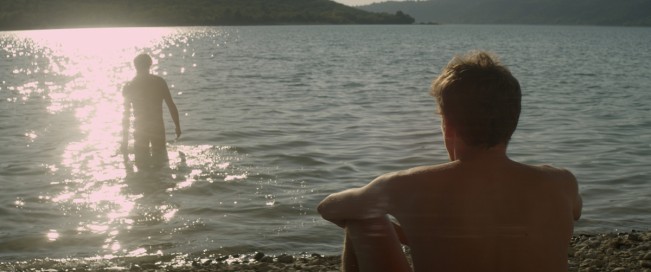

By Ray Pride Pride@moviecitynews.com
Sundance 2014 Review: Stranger By The Lake
 Classically constructed, as rigid in its construction of suspense as any recent thriller, Alain Guiraudie’s Stranger by the Lake (L’inconnu du lac), is a masterful work, uncluttered yet lush, formally regimented, yet always surprising. (Call it full-frontal Hitchcock.) It also takes its location, its construction of sexuality, as commonplace. Guiraudie’s movie is assuredly part and parcel of queer cinema, but also of the cinema of the quotidian, of the everyday.
Classically constructed, as rigid in its construction of suspense as any recent thriller, Alain Guiraudie’s Stranger by the Lake (L’inconnu du lac), is a masterful work, uncluttered yet lush, formally regimented, yet always surprising. (Call it full-frontal Hitchcock.) It also takes its location, its construction of sexuality, as commonplace. Guiraudie’s movie is assuredly part and parcel of queer cinema, but also of the cinema of the quotidian, of the everyday.
At a remote lakeside somewhere in France—which Guiraudie says is in the provinces of the South, where he grew up—men come each sunny summer day to sun, to cruise, to meet, the converse or to exchange gestures, and in one case, to murder. The scene is rustic, verdant, removed from the outside world. There is the sun and the sea, men in states of undress and arousal, the caress of wind on the water, the wind through the trees from rustle to rush, the gentle murmurs of those who move from shore to forest to realize their acquaintance. We could be near a city, far from care, or simply in an idealized utopia, at least until a man is drowned. (“My rural childhood surroundings undoubtedly influenced my character,” Guiraudie says.) The surroundings are the most accomplished of sinister landscaping since Martha Marcy May Marlene. He uses images of the water similarly: a shadow falls across its surface and dark green serrates atop lighter green, a thrilling geometric diagonal that represents its psychological moment perfectly.
“Representing sexuality in a natural, unforced way is the most difficult thing, since it is a deeply personal matter,” Guiraudie said at a press conference I attended at the November 2013 Thessaloniki International Film Festival. “It is also hard to avoid cinematic clichés and stereotypes when reminiscing about our own experiences. I touched on gender-related, sexual issues late in my career. Stranger by the Lake is the result of my personal reflections on how to best depict passion, its sexual expression and sexuality between men.” (There is nudity throughout, but a handful of explicitly sexual scenes are plainly transacted by body doubles.)
Stranger By The Lake is uncommonly adroit in depicting “difference” by suggesting what we see is simply what is. The choreography, the unacknowledged dance of desire as the characters arrive, peruse, transact, mimics other forms of attraction, repulsion, human interactions. The characters situate themselves in the landscape in hope of sexual exchange, but also as figures in the landscape, like figures in a painting. Across the ten days of the story, the setting establishes itself as its own “normality.” (In a conversation in Cinema Scope magazine, Portuguese director João Pedro Rodrigues pleased Guiraudie by correctly calling his film “a documentary thriller.”)
In appearance, a solitary police inspector, who asks questions once a man has gone missing, seems not of the outside world, but of this world, of this glade for cruising, who has not yet cast his clothes aside in his quest. He asks more questions than anyone: his curiosity could be either sociological or sexual: he wonders more about the drive to love and the drive to hate than anyone else in the story.
Guiraudie forgoes a score, but the sound design is as effective as Bernard Hermann’s to Alfred Hitchcock’s The Birds: the wind in the trees can suggest passion, anger, retribution. Does the world reflect troubled inner states or are the characters merely in sync with nature? Insects trill, hum or buzz at very specific moments, singly and in chorus.
Stranger by the Lake is also satisfying for its refusal of answers, both in plotting and psychology. Much is left open. Guiraudie’s protagonist is left with many things: his confusion, his fear, his desire, his loneliness. “I think it is natural that the film starts from realism and gradually evolves into abstraction,” Guiraudie said in Thessaloniki. “It begins with a world that is hedonistic and sunny and ends up in a dark nightmare. I chose this ending for many reasons; one of them was that it has an intensely existential character.”













